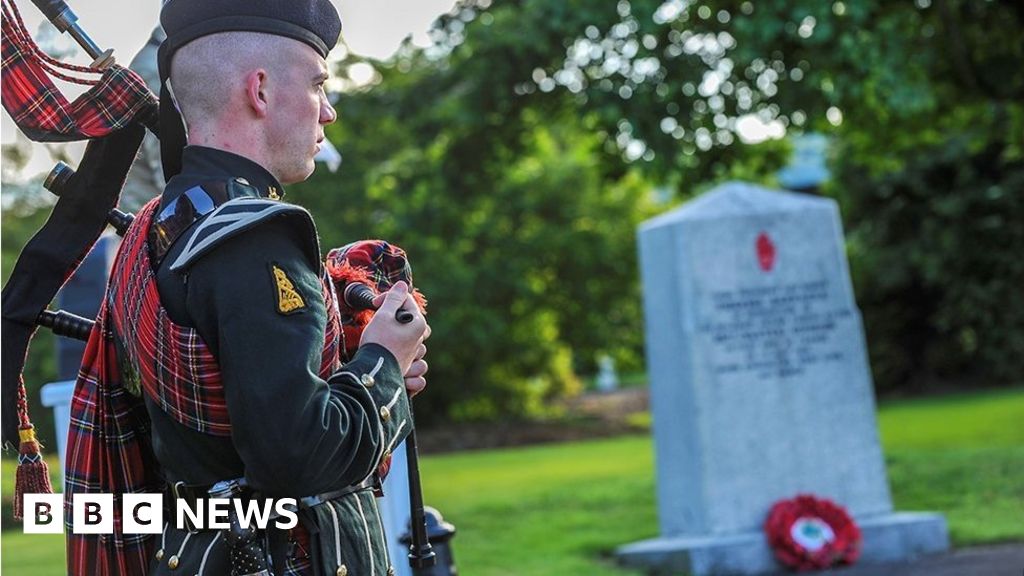Somme 100 Years On
Collapse
X
-
Don't the public commemorations serve as a reminder? Should we not be reminded? I only watched the highlights of the Somme ceremonies at Thiepval, but did not think them celebratory at all. Nor much I'd call pomp and parade, and the readings, many from letters and diaries of those who were there, gave ample material for reflection. As did the camera occasionally focusing on headstones with no name from time to time.
I'd echo Mercia's question about anger.
The French and Germans held a mutual ceremony at Verdun.
Perhaps we should get over holding so many commemorations in Anglican churches, on the assumption that all the fallen were Christian.
Comment
-
-
It's always the military aspect of these commemorations that upsets me - especially gun firing salutes, which to me are utterly inappropriate, unless someone who understands their symbolism better than me can explain them. But my guessing is that while there are still people who remember World War II these sorts of commemorations will be felt to be needed, along with the lapel medals and ribbons, that particular war (unlike WW1) being seen consensually as a justified war, unless one is or was a pacifist. It's a sad reflection on the values underpinning our so-called civilisation when, sermonising at Lutyens' Somme memorial, the Archbishop of Canterbury can deplore the wasteful sacrifice of life and in the same sentance praise the honourable heroism of those who sacrificed their lives.Originally posted by oddoneout View PostPerhaps that, and the fact the centenary has been reached, should be the point to move into a different form of remembrance, one that takes forward the idea that war, and its needless casualties, is an abomination, something that should be regretted not celebrated. The modern approach to life which turns minor incidents into 'tragedies' and unremarkable people into 'heroes' does a disservice to commemoration, and what should be a time for quiet and personal reflection, and a resolve to work towards removing the 'need' for such occasions, risks becoming simply a public outpouring of emotion.
Comment
-
-
This is very much what I feel. I dislike seeing people in uniform at these things, still worse if there is marching.Originally posted by Serial_Apologist View PostIt's always the military aspect of these commemorations that upsets me - especially gun firing salutes, which to me are utterly inappropriate, unless someone who understands their symbolism better than me can explain them. But my guessing is that while there are still people who remember World War II these sorts of commemorations will be felt to be needed, along with the lapel medals and ribbons, that particular war (unlike WW1) being seen consensually as a justified war, unless one is or was a pacifist. It's a sad reflection on the values underpinning our so-called civilisation when, sermonising at Lutyens' Somme memorial, the Archbishop of Canterbury can deplore the wasteful sacrifice of life and in the same sentance praise the honourable heroism of those who sacrificed their lives.
Comment
-
-
Indeed so - and thank you for posting. Do you think, though, that this thread should be merged with the Somme 100 one?Originally posted by Anastasius View PostMaybe I've missed a thread elsewhere but slightly bemused that this moving tribute has not been covered.
At many London stations this morning, were men dressed as soldiers en route to the trenches in WW 1. No advance information was given by the brilliant superb people that organised this. These men just stood there - as if waiting for their train to the front. Silently. Most commuters passed on by - oblivious. Some sadly just gawped and said 'Gee - are they making a film'.
A few. A very few went up to the soldiers, as they knew what this was all about, and tried to engage in conversation. The soldiers stayed silent and, instead, simply handed out a card with details of the name of a soldier who died today, one hundred years ago.

I found that very moving.
P.S.; I see that this has now been done - many thanks.Last edited by ahinton; 02-07-16, 15:30.
Comment
-
-
I find the current "heroes" bandwagon rather challenging. Many heroic acts take place in wars, but to label everyone in military forces a hero dilutes the achievements and sacrifices of real heroes.Originally posted by oddoneout View PostPerhaps that, and the fact the centenary has been reached, should be the point to move into a different form of remembrance, one that takes forward the idea that war, and its needless casualties, is an abomination, something that should be regretted not celebrated. The modern approach to life which turns minor incidents into 'tragedies' and unremarkable people into 'heroes' does a disservice to commemoration, and what should be a time for quiet and personal reflection, and a resolve to work towards removing the 'need' for such occasions, risks becoming simply a public outpouring of emotion.
Comment
-
-
Originally posted by mercia View Postanger directed where, and expressed how ?
This was built in the late C18, at the forefront of the technology of the time.
The market for its products was a series of devastating wars.
which doesn't answer your question, but provides some guidance, IMO.
Nothing much has changed, it seems to me.I will not be pushed, filed, stamped, indexed, briefed, debriefed or numbered. My life is my own.
I am not a number, I am a free man.
Comment
-
-
Reminded of what, and to what purpose? Reminded of the terrible carnage that the old politicians condemned the young men of Europe to endure in their name is certainly worth remembering; and used as the basis to declare "never again" - but with contemporary politicians using the occasions for a photo opportunity, and with celebrity readings, there is a nasty sensation that instead, today's young are being presented with paradigms for their own behaviour. That they must do as they're told when they're told, just as their forebears did 100 years ago - and be grateful to do so.Originally posted by Rue Dubac View PostDon't the public commemorations serve as a reminder? Should we not be reminded?
Well, as a symbolic gesture of anger, the young soldiers (as representing those of 100 years ago) could ceremonially turn their backs on the political figures present (to express contempt for the politicians of 100 years ago that they represent).I'd echo Mercia's question about anger.
If these ceremonies are genuinely meant to "remind" us, then anger NEEDS to be expressed in some way - otherwise, we've learnt nothing, and our memories have become very selective.[FONT=Comic Sans MS][I][B]Numquam Satis![/B][/I][/FONT]
Comment
-
-
But if we're not also reminded of the causes of the sadness and waste, then we're not fully "remembering". Anger at this sadness and waste - and contempt for those who brought it about - are essential, I believe, Padraig; essential to help prevent history repeating itself; essential to prevent such ceremonies from becoming meaningless; essential to express our appreciation of what the young men were put through.Originally posted by Padraig View Posthttp://www.bbc.co.uk/news/uk-northern-ireland-36679020
I don't think contempt and anger seem to fit here. We are reminded of the sadness and the waste.[FONT=Comic Sans MS][I][B]Numquam Satis![/B][/I][/FONT]
Comment
-
-
Indeed, that would be very effective, but might be regarded as mutiny.Originally posted by ferneyhoughgeliebte View PostWell, as a symbolic gesture of anger, the young soldiers (as representing those of 100 years ago) could ceremonially turn their backs on the political figures present (to express contempt for the politicians of 100 years ago that they represent).
Comment
-
-
I think I intended to illustrate my point with the section of the link that dealt with only the Dublin ceremony; unfortunately the whole news item was copied. I hate to 'bang on', but I really do not think that 'anger' and 'contempt' are appropriate emotions for the tragedy of the Somme. The officer in the Dublin clip dealt with the folly of that campaign quite differently and effectively.
Comment
-
-
I tried and lasted for, ooh, about ten bars before I switched off. Ghastly plink-plonk modern jarring to these ears music (if it can be called music). I put on Britten's War Requiem instead.Originally posted by jean View PostDid anyone hear Iain Bell's In Parenthesis this evening?Fewer Smart things. More smart people.
Comment
-



Comment